
If I knew then, what I know now!!! YouTube
Grammar Reference Irregular Verbs List Definition: To Know Irregular verb: To Know Verb conjugation: Know - Knew - Known Meaning of 'To Know' To be acquainted with To have correctly in your memory Conjugation of verb 'Know' Irregular Verbs Following a Similar Pattern Verbs like: Want to learn about the irregular verb 'to Know'?
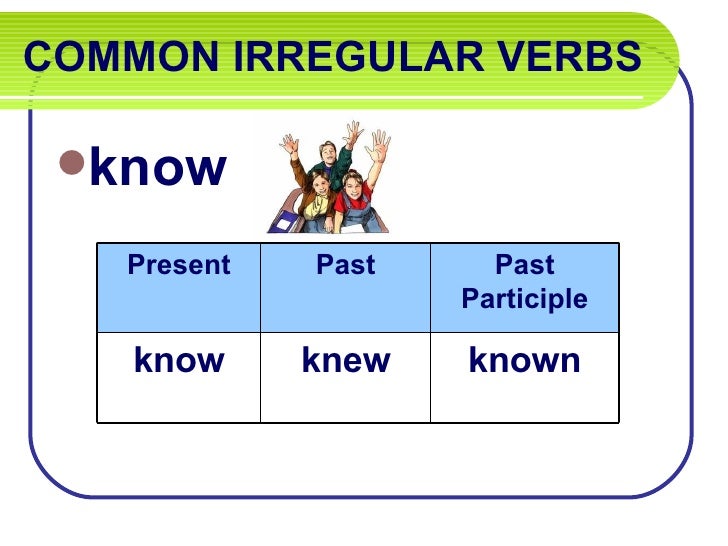
Verbs Irregular 2
To Know Conjugation; To Know Infinitive: to know Gerund: knowing Past participle: known Simple past: knew Irregular forms Auxilliary verb Spelling change Use contractions. Positive Negative. Indicative. Positive Negative. Present. I know I know: you know you know: he/she/it knows he/she/it knows: we know we know:
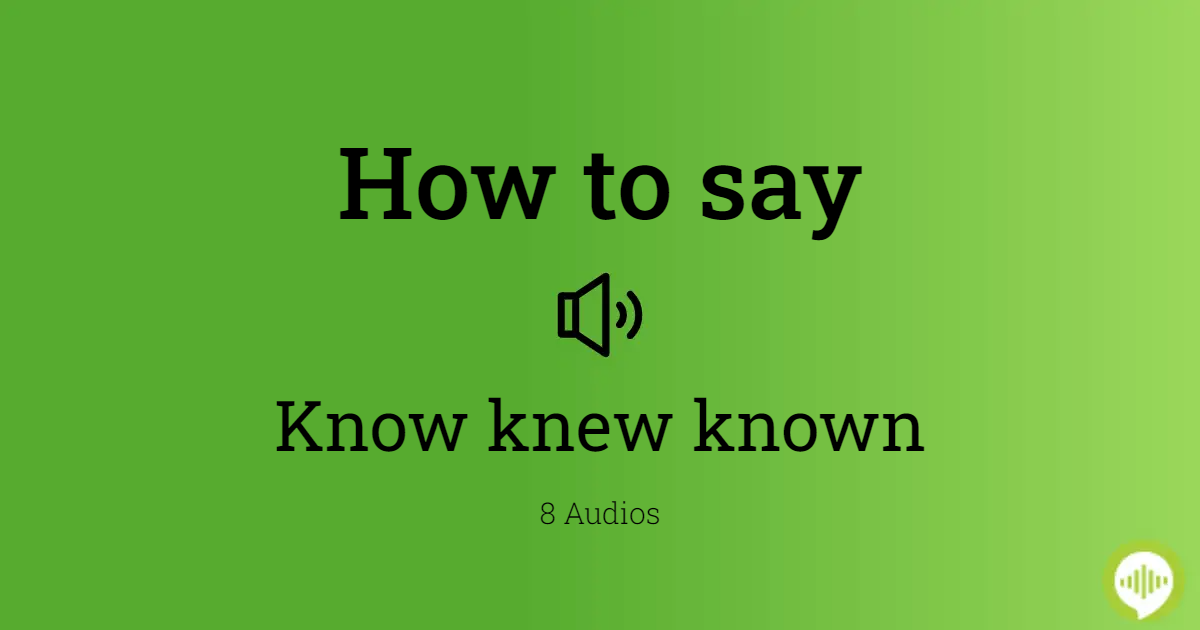
How to pronounce Know knew known
The excerpt below is taken from Advanced Grammar in Use:. We can use will to draw conclusions or state assumptions about things that are the case now.. You will know that Ewan and Lucy are engaged. (= I assume you already know) The writer's explanation given in parentheses, in my view, implies that the the person that the person being spoken to (which the pronoun you refers to) knew about the.

Know Past Simple, Simple Past Tense of Know, V1 V2 V3 Form Of Know Know
Conjugación verbo know - inglés X Inglés Conjugar Herramientas: Modelos Inglés británico y americano Verbos auxiliares y modales Verbos irregulares know saber; conocer; entender;. Infinitive to know Preterite knew Past participle known Modelo : grow Auxiliar : have, be Otras formas: know oneself / not know Contracciones Publicidad Indicative
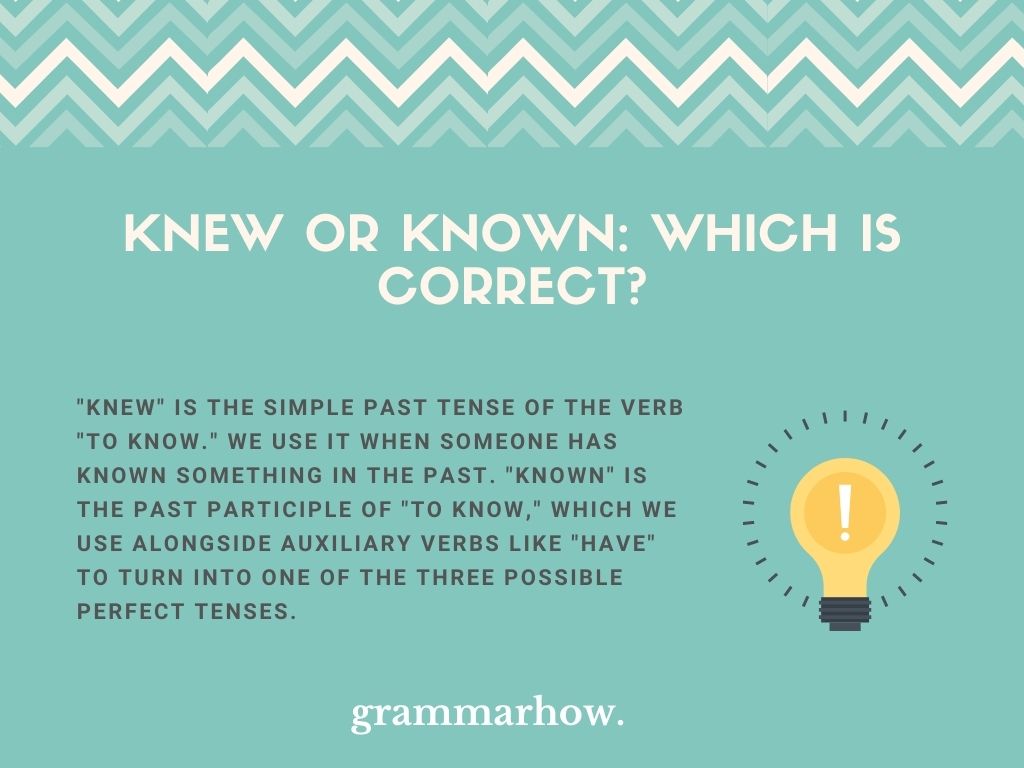
Knew or Known Which Is Correct? (Helpful Examples)
1 [ noh ] show ipa See synonyms for: know knew knowing known on Thesaurus.com verb (used with object),knew, known, know·ing. to perceive or understand as fact or truth; to apprehend clearly and with certainty: I know the situation fully.
AGIKgqPNL9vIeEZjVeRjlzkHEJdkNpbT74t7kULgSk=s900ckc0x00ffffffnorj
Clarifying "Knew" vs. "Known" Through Real-Life Examples. The distinction between "knew" and "known" can be understood better by examining real-life usage examples. By doing this, proper application of these verb forms in everyday communication will become clearer. Let's dive into a few examples to truly grasp their correct use.

3 формы глагола KNOW KNEW KNOWN
Be familiar or acquainted with a person or an object "She doesn't know this composer "; "Do you know my sister ?"; "We know this movie "; "I know him under a different name " Have firsthand knowledge of states, situations, emotions, or sensations "I know the feeling !"; - experience, live
.webp)
Know, Knew, Known Which is the Correct the Past Tense and Past
Know - English Grammar Today - a reference to written and spoken English grammar and usage - Cambridge Dictionary

Know Clip Art Free Images and Photos finder
know (third-person singular simple present knows, present participle knowing, simple past knew or (nonstandard) knowed, past participle known or (colloquial and nonstandard) knew) ( transitive) To perceive the truth or factuality of; to be certain of or that. 1985 April 17, Frank Herbert, 15:46 from the start, in Frank Herbert speaking at UCLA.

Irregular Verbs With Pictures
Present. I would know. you would know. he would know. we would know. you would know. they would know.

MONKEYABOUT KNOW KNEW KNOWN
Simple Past Tense He/She/It knew or knowed (dialect),. I knew or knowed (dialect),. You/We/They knew or knowed (dialect),. Past Continuous Tense He/She/It was knowing. I was knowing. You/We/They were knowing. Past Perfect Tense He/She/It had known, knowen (archaic), or knowed (dialect). I had known, knowen (archaic), or knowed (dialect).
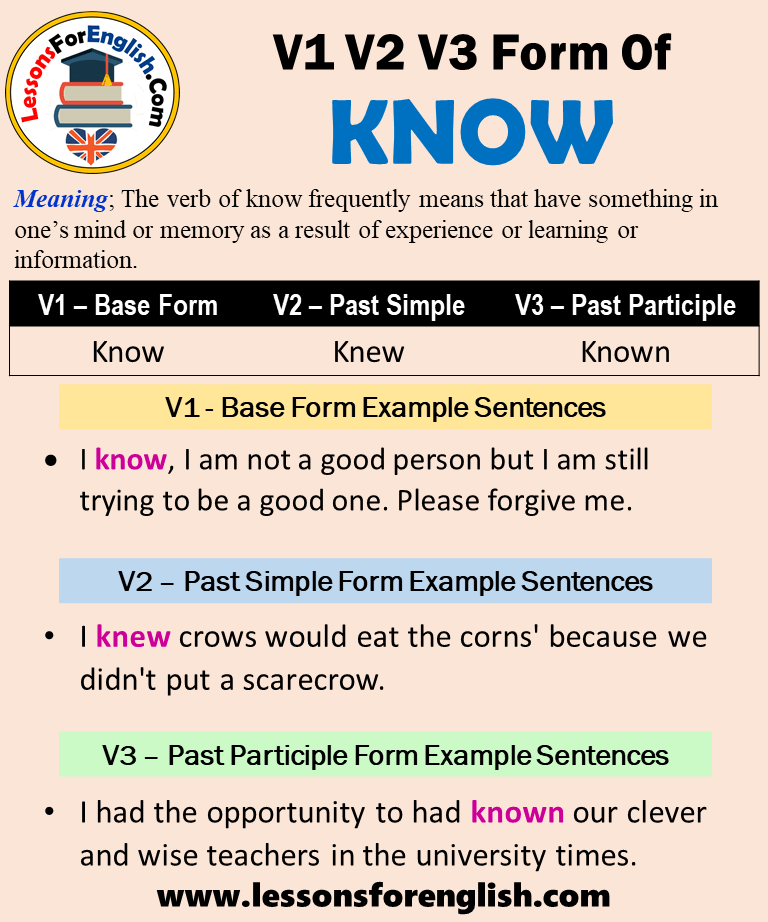
Past Tense Of Know, Past Participle Form of Know, Know Knew Known V1 V2
"Knew" is the simple past tense form of "to know." "Known" is the past participle form of "to know," used with auxiliary verbs. Correct usage of "knew" and "known" indicates precise times or connections to the present. It is important to recognize when to employ these forms correctly to convey the intended meaning.

KNOWING GOD — Amazing Love
Present. I would know. you would know. he, she would know. we would know. you would know. they would know.
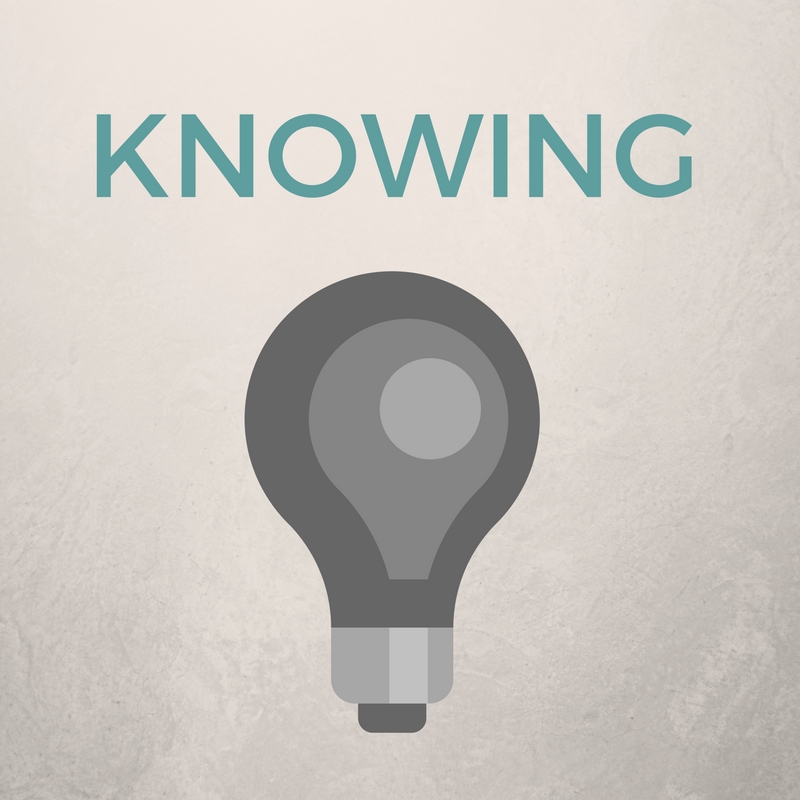
Knowing Faith and Reason, Part One Mary Jo Sharp
Knew or Known: Which Is Correct? "Knew" is the simple past tense of the verb "to know." We use it when someone has known something in the past. "Known" is the past participle of "to know," which we use alongside auxiliary verbs like "have" to turn into one of the three possible perfect tenses.

Conjugación Know 🔸 Verbo inglés en todos los tiempos y formas
Dictionary entry overview: What does know mean? • KNOW (noun) The noun KNOW has 1 sense:. 1. the fact of being aware of information that is known to few people Familiarity information: KNOW used as a noun is very rare. • KNOW (verb) The verb KNOW has 11 senses:. 1. be cognizant or aware of a fact or a specific piece of information; possess knowledge or information about

Knowing Me Knowing You The Complete Radio Series BigaMart
knew ˈnü also ˈnyü ; known ˈnōn ; knowing Synonyms of know transitive verb 1 a (1) : to perceive directly : have direct cognition of (2) : to have understanding of importance of knowing oneself (3) : to recognize the nature of : discern b (1) : to recognize as being the same as something previously known (2) : to be acquainted or familiar with (3)